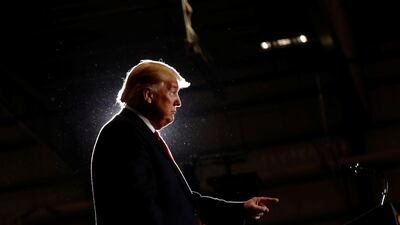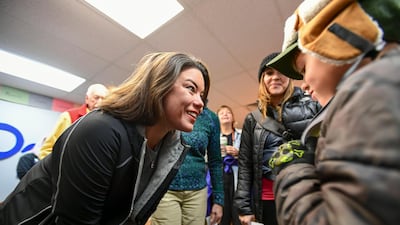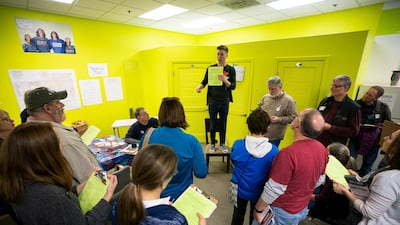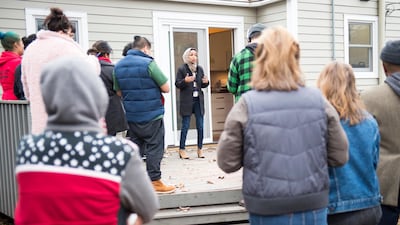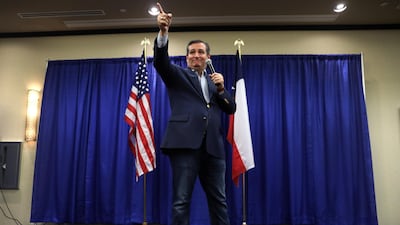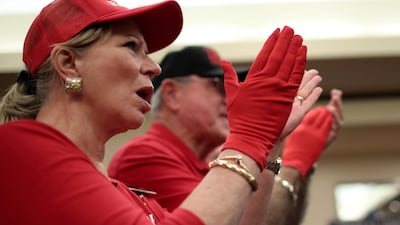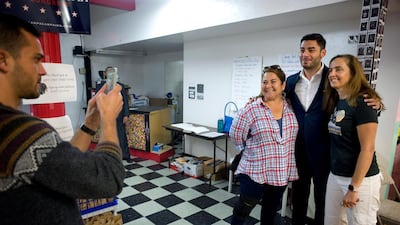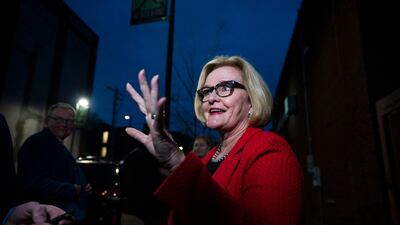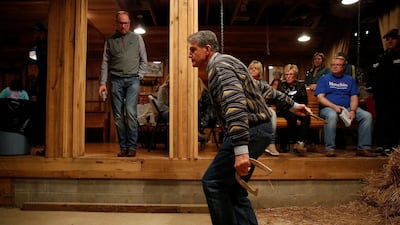Updates: Follow our live coverage of the midterms
If the competing commercials were a yardstick for who Arizonans could pick as their next US senator they would choose either a cold-hearted Republican who voted to gut healthcare benefits or a lily-livered peacenik Democrat who sympathises with the Taliban.
Such messages have for weeks aired from early morning until late at night, a series of dire warnings designed by their creators to maximise the failings of their target, while making only brief mention to the merits of their own candidate. Not so much a sales pitch as a non-sales pitch.
This political attack advertising accounted for much of the $90 million spent up until two weeks ago in Arizona – the largest figure for any US state according to Kantar Media/CMAG, a company that tracks the industry. So far, however, the money does not seem to be having a decisive effect.
In what has become one of the closest political contests in the country, Republican candidate Martha McSally is estimated to have a slim lead. A decorated Air Force pilot who flew combat missions in Iraq and Afghanistan, she plays heavy on her patriotic credo. Elected to the House of Representatives in 2014 after leaving the military as a colonel, she has sought to contrast her service with the activism of her opponent Kyrsten Sinema. One such McSally campaign commercial pictured her in her flight uniform while her Democratic rival was shown wearing a pink tutu at an anti Iraq war demonstration.
Last month, Ms McSally went one step further, accusing her opponent of treason and of holding extreme views. The claim related to an unearthed clip of a 2003 interview where Ms Sinema said “I don't care”, when taunted by a radio host who talked about hypothetically joining the Taliban.
The allegation has not stuck. In a state where many voters are ageing, healthcare – and the Republicans' long sought repeal of the Affordable Care Act brought into law by Barack Obama in 2010 – has dominated. Having voted as a congresswoman in 2015 to undo measures that gave millions of Americans medical coverage they could not previously afford, Ms McSally has been hobbled by her record.
Having initially attempted to broaden her appeal to wavering voters by saying she worked with Democrats in Congress to come up with a better healthcare policy, Ms McSally has again changed tack, playing up a strong national economy and tough stance on immigration, both led by President Donald Trump's administration. That too has been a political journey. Like many Republicans in 2016, she had not endorsed Mr Trump for president.
_________
Midterms:
2018 midterms: everything you need to know about the US elections
US midterm results could constrain Trump’s Middle East agenda
Midterm elections: Could Trump cost Republicans House majority?
Women are leading the charge in the US midterms
_________
But the Republican candidate has come up against a younger opponent who has cited her record in Congress as opposed to an anti-war stance she held in her 20s while a law student. Miss Sinema, now 42, was elected to the House two years earlier than her rival, and, just like Republicans, she has backed military action against ISIS, also serving on a congressional task force to investigate terrorism financing. Some polls put her ahead of Ms McSally.
Whoever emerges victorious will make history as the first female senator for Arizona.
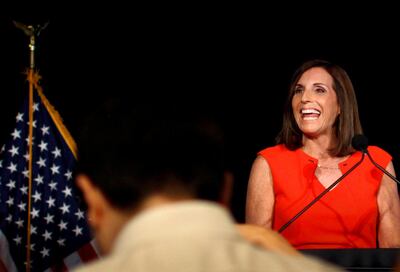
An average of polls, most within the margin of error, effectively has the contest in a dead heat. The Democratic pick has remained moderate and shunned the offer of big name supporters, including former president Obama, joining her on the campaign trail, fearing it will alienate the wavering voters she needs to attract.
Ms McSally's failure to conclusively edge ahead in what should be a safe Republican seat – Arizona has not elected a Democrat to the Senate since the 1980s or the White House since Bill Clinton in 1996 – has seen her align herself with Mr Trump. The candidate's team has pushed harder for traditional Republican voters in the past two weeks, using illegal immigration at Arizona's border as a political rallying point. The president, who won Arizona in the 2016 election by a lower than usual 4 per cent, and Vice President Mike Pence, have both visited to campaign for Ms McSally, as has former president George W Bush. On Thursday, President Trump's son, Donald Jr, arrived to offer further support.
Mirroring Mr Trump's playbook and strongest voter constituency, polls place Ms McSally ahead among whites, particularly men. Ms Sinema is stronger among all other demographic groups. The split means the race is a virtual toss-up.
“It suggests to me that McSally's own polling is placing her behind Sinema,” said Bruce Oppenheimer, a public policy professor and congressional elections expert at Vanderbilt University in Nashville, Tennessee.
“Arizona is a state where a Republican should win pretty easily. It's surprising that it's this close but I guess we're seeing that Republican House members running for the Senate are having to align themselves with Trump.”
Arizona has for 20 years offered early voting and the near 1.4 million ballots already cast show the Republican candidate ahead, but not by as much as expected.
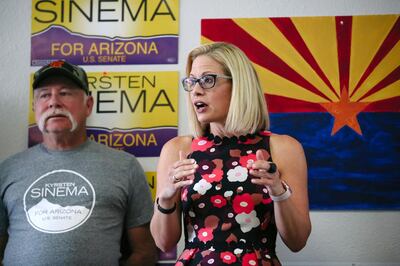
With Republicans currently holding the White House and both houses of Congress, Paul Bentz, an Arizona pollster and political consultant, says the traditional trend of the pendulum swinging against the incumbent party is helping the Democrats.
“It's going to come down to how these two candidates close,” said Mr Bentz, whose Arizona car registration plate - “TURNOUT” - perhaps offers a clue to the outcome.
“The problem for McSally is that while her order, discipline and service approach is strong, the people who are attracted to it have already bought in and probably cast their ballot. Her team is struggling to find a compelling closing appeal.”
As such, the Republicans are trying to hold on to their early ballot advantage, with figures showing the party's registered voters at 41.8 per cent of those who have already participated in the election, almost eight points up on registered Democrats (33.9 per cent).
The remaining 23.6 per cent of Arizona voters who are not affiliated with either of America's dominant political parties, but who have already made their picks for the Senate, and those who will vote on Tuesday could prove decisive. Women who normally vote Republican but who are this time wavering will be among the last to make their decision and are thus being courted by both candidates in the closing days, according to Mr Bentz.
In a rare moment of truce, the two women had earlier shared the spotlight at a sporting event when Arizona State University's college football team – the Arizona State Sun Devils – played their homecoming game. But even on a sports field, the public roles they played before Arizona emerged victorious appeared to reflect their political shtick; Ms McSally, in jeans and a t-shirt, roused the stadium by singing the national anthem. Ms Sinema, stood in the middle of the two teams, calmly officiated over the coin toss, before telling several Arizona players to “kick some ass.”
But with 48 hours until polling day – early voting closed on Friday - television commercials remain relentlessly negative.
“Martha McSally will say anything to get your vote. Even lie,” said one aired late Saturday by a group supporting Ms Sinema.
“Sinema voted against protecting our borders,” said a rival ad, accusing the Democrat of once leaving a meeting to instead meet her political donors. Another, personally endorsed by Ms McSally, called her opponent "an extremist, an elitist and a fraud".
